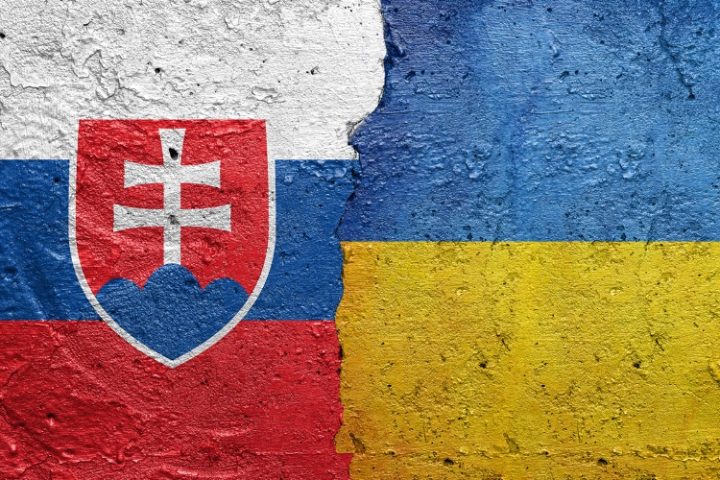
On November 16, truck drivers in Slovakia temporarily blocked a border crossing with Ukraine, demanding protection from what they regarded as unfair competition from Ukrainians and threatening a long-term blockade, just like the one presently in place in Poland.
The Union of Auto Transporters (UNAS) organized the protest at the Vyšné Nemecké-Uzhgorod checkpoint and touted it as an articulation of solidarity with Polish truckers. Both Slovak and Polish truckers criticized the EU for suspending a system of permits for Ukrainian drivers, one of many strategies the EU has adopted to economically support the Kyiv regime in its conflict against Moscow.
Formerly, only a limited number of permits were issued each year, alleviating the pressure on local truckers. Protesters claimed that Ukrainian drivers did not have to abide by the rules that transport firms in the EU have to comply with, and thus can outcompete Poles and Slovaks.
“Our goal is to support our Polish colleagues, as well as all carriers in the EU. We ask the European Commission to immediately introduce transportation permits for Ukrainian vehicles,” UNAS chairman Stanislav Skala declared in statements to the media.
Skala cautioned that if circumstances do not change within seven days, the group would adopt a Polish-style blockade next.
Polish truckers began their blockade in early November, impacting Slovakia as drivers rerouted their trips. A line of trucks waiting for a check stretching as far as 25 kilometers was reported on the Slovakian side of the border this week. Typically, border officials can deal with around 170 vehicles daily. However, this week saw an estimated 800 mostly Ukrainian trucks attempting to cross over.
Both Slovakia and Poland hitherto enforced national bans on Ukrainian grain, after an EU-mandated restriction expired in September, to shield local farmers from Ukrainian competition. Ukrainian President Volodymyr Zelensky lambasted the measures as “un-European.”
Earlier this month, Ukraine’s ambassador to Poland, Vassily Zvarych, also lashed out at Polish truckers for staging a blockade on several border crossings. The protesting truck drivers have promised to effectively shut the border until Warsaw addresses their grievances against Ukrainian competition.
The truckers pledged to permit only one truck to pass per hour, excluding those carrying military or humanitarian aid, or with perishable goods and livestock.
These Polish truckers likened their action to the recent unhappiness among Polish farmers, who have repeatedly called for the Warsaw government to halt the flood of cheap Ukrainian grain imports into Poland.
“We’re going to do it the way farmers did — keep protesting until the government acknowledges there is a problem and does something about it,” Jacek Sokół, the owner of a small trucking company and the deputy head of the Committee to Protect Transporters and Transport Employers, the group behind the protests, has proclaimed.
Ukrainian officials soon got news of the Polish protests, with Zvarych decrying the blockade as a “strike in the back” by the Polish.
“The corridors of solidarity between Ukraine and the EU, going through the territory of Poland are under threat,” the diplomat posted in a statement posted to social media.
“We call on the Polish protesters to stop the blockade of the border and choose other forms of defending their rights that would not impede movement across the border,” he continued, positing that these protests were playing into the hands of the “common enemy” of Kyiv and Warsaw — the “Russian terrorists,” as he termed them. Moreover, the truckers’ protests undermines not only the interests of the two nations, but all of Europe, he claimed.
Limitations on the number of Ukrainian-registered trucks entering the EU though Poland and elsewhere were removed early in the ongoing conflict between Moscow and Kyiv in 2022. Consequently, a torrent of Ukrainian trucks entered Poland, with the number of crossings having increased to some 900,000 this year alone, based on Polish media reports. Before the conflict between Kyiv and Moscow erupted last year, Ukrainian truckers obtained an average of 160,000-180,000 permits annually to enter Poland for particular shipments or transit.
Both Warsaw and Brussels have called on the truckers to end the blockade, but the Polish authorities have maintained that they could not do anything as long as the EU-wide measure remained in effect.
Also, a Der Spiegel report hinted that Polish border guards were clandestinely backing the truckers’ protests, as freight processing times have increased considerably in recent months.
Some EU officials have denounced the protests. “I totally discourage this kind of behavior of blocking a border. It’s not something very European,” EU Transport Commissioner Adina Valean told Politico, highlighting that officials were working to address the matter.
Meanwhile, Mykhailo Podolyak, Zelensky’s most senior advisor, bemoaned on November 17 that the delivery of Western arms to Kyiv should have been faster than it had been.
In an interview with Ukraine’s 24 Kanal TV, the official pointed out that extended delays in transporting the weapons gave Russia ample time to gear up for strategic defense by the moment the arms finally arrived.
Podolyak lamented that the military aid pledged by the West should reach its destination “in seven to ten days, as long as it takes for logistics,” while in reality the process takes “90 or 120 days.”
Regarding the current situation at the front line, Podolyak acknowledged that Ukraine’s counteroffensive “probably” was not proceeding “to the extent or at the speed we would like.”
Since early June this year, Kyiv’s troops have been waging a counteroffensive against Russia that has failed to yield any significant gains on the battlefield. Speaking to The Economist earlier this month, Ukrainian general Valerii Zaluzhnyi revealed that the situation on the battlefront had reached “a stalemate.”
On November 14, EU foreign policy chief Josep Borrell remarked on the EU’s pledge to provide Kyiv with one million artillery shells by March 2024, stating that more than 300,000 of them had been sent. Nonetheless, “it is difficult to get more now,” Borrell admitted, noting that he would have to “mobilize the stocks of European armies.”
The same day, Zelensky admitted that deliveries of key artillery shells to Ukraine had “decreased” following the Israel-Hamas conflict in Gaza in early October.
Earlier this month, Russian Defense Minister Sergey Shoigu said that “despite the supply of new kinds of NATO weapons, the Kiev Regime is losing.”
The Russian diplomat also estimated Ukraine’s losses at more than 90,000 troops, as well as around 600 tanks and 2,000 armored vehicles.



